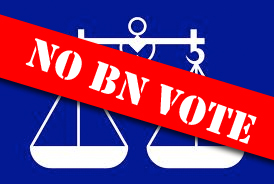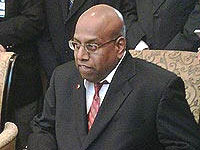IF only voting were easy. For one thing, I’m still waiting for the Election Commission (EC) secretariat to tell me why my absent voter application was rejected.
Karpal Singh
If the EC eventually approves my application — or if the elections coincide with my summer research at home — and if intra-party seat allocations don’t change, I’ll have an obvious choice in Bukit Gelugor:Karpal Singh of the DAP.
It should be the other way around: in a well-functioning democracy, voting logistics should be straightforward, but voting decisions difficult because of rigorous competition between highly qualified candidates. The idealism of my youth says we’ll get there one day. In the meantime, the coursework of my political science degree says more than I can manage to read about voting behaviour under suboptimal conditions.
The voting game
Voting is a symbolic act, the core form of political participation in a modern democracy. But it is also a game. Politicians and parties strategise to win power; voters strategise to win the best possible government.
Enter uncertainty: you know little about how others will vote and how that will affect the composition of government. Neither can you know how faithfully your chosen party will represent your preferences throughout its term.
The voter’s responsibility and privilege, then, is to guess the future from the past, scrutinising the track records of both candidates and parties.
It isn’t just about corruption. This is not to discount the fact that countless Malaysians are legitimately jelak with the continual betrayals of public trust that the ruling coalition has committed over five decades in power. Still, no political party can claim that it has always acted in public interest and never for private gain — no more than any individual can claim to have always acted altruistically.
Over the course of its mandate, any governing party is bound to face allegations ofcorruption, unfounded or otherwise. But how parties react to such allegations — with transparency or stealth; with loyalty to principles or to personalities — is paramount.
While neither of our political coalitions has grown into an ideologically consolidated and disciplined political organisation that successfully distances itself from tainted politicians, the PR parties show an understanding of such principles as well as leaders who aspire to get us there — even if I may not trust all of them. On the BN side, suffice to say I’ve always been amused that the English translation of their name brands them as a “Front”.
Manifesting divisions, imagining unity

No vote for BN as they continue dividing Malaysians according to racial lines
That said, I would not want to vote for the BN even if they had a spotless track record. As a young citizen in a young political system, I want a government that I can grow old with. I can live with cranky differences of opinion — if I always agreed with my government, I’d be worried that their propaganda apparatus was too effective. I can also live with occasional lapses in judgement — as long as lapses into corruption are acknowledged and redressed. But I cannot live with a government entrenched in divisions that are fundamentally irreconcilable with my vision of Malaysia.
The BN was established in 1973, succeeding the 1951 Alliance Party. It still operates along the ethnically fragmented consociational model inherited from colonial divide-and-rule policies. PR was established in 2008, succeeding the 1999 Barisan Alternatif. It is still in the throes of growing pains, but I believe it is straining towards inclusivity.
Consider the coalition manifestoes. While the BN manifesto states that “Barisan Nasional is for everyone”, it intends to incorporate everyone by ensuring that “all ethnic groups are represented” with “power sharing [that] is genuine, along with a strong spirit of togetherness and ‘give and take’”. While commendable in intention, this model is not only shaky — as history has shown — but, more problematically, is founded on the assumption that ethnicity is the defining category in the Malaysian political sphere.
In contrast, the PR’s Buku Jingga speaks of a common policy platform for “all the rakyat”. References to race emphasise linguistic and economic justice for “all races” or “regardless of race”. This is much closer to my Malaysia: defined by unity while appreciating diversities, not defined by difference while recognising commonalities.
Choosing to include
Muhyiddin
Two caveats are necessary. Both relate to individuals within these encompassing ideas of nationhood and politics. First, political manifestoes have only as much weight as their representatives lend to them. In the BN case, Deputy Prime Minister Muhyiddin Yassinexpressed his identity — “Malay first, Malaysian second” — in a form that reinforces my cynical reading of the BN manifesto.
In the PR case, PAS president Abdul Hadi Awang recently addressed doubts about his party’s openness to other races by affirming inter-religious tahaluf siyasi (political alliances), drawing on principles from his faith identity to strengthen his national identity. I can only hope to emulate that balance.
Second, the vision of Malaysia articulated above is personal. While I believe that many share it, and while I sincerely hope that many more will come to share it, I have no right to impose it on anyone.
Virtually everything in my upbringing inclines me to reject the assertion that everything has to be racial — or that everyone is racist. But countless others have experienced Malaysia in ways deeply shaped by ethnicity, and I cannot deny their experiences if I insist that they recognise mine. But I need not let their beliefs colour my vote. 
 After 55 years of rule, the BN government’s national debt is about to hit 55 percent of the GDP. Malaysia’s indebtedness has been increasing about 1% every year. But the deputy finance Minister Datuk Awang Adek Hussin still insists that our debt level is still manageable “It is not at a critical level at the moment. Our self imposed limit or threshold is 55 percent of the Gross Domestic Product (GDP)’, he added.
After 55 years of rule, the BN government’s national debt is about to hit 55 percent of the GDP. Malaysia’s indebtedness has been increasing about 1% every year. But the deputy finance Minister Datuk Awang Adek Hussin still insists that our debt level is still manageable “It is not at a critical level at the moment. Our self imposed limit or threshold is 55 percent of the Gross Domestic Product (GDP)’, he added.